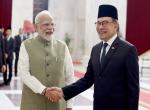As early as 1809, Sweden created an Ombudsman whose main job was to provide a forum for ventilation and remedy of public grievances against government and its officials for their inaction or unjust actions. Obviously corruption was not so much an issue for Sweden, but arbitrariness and wilfulness of government was an issue which agitated the people. It says much for the King and Government of Sweden that they set up an office of Ombudsman, accountable only to Parliament, whose principal duty was to ensure that government functioned in accordance with the law, rules and regulations and that any citizen could approach the functionary for redressal of any grievance that he might have against government. Obviously the objective of creating this office was to ensure that there was good government in Sweden and that it was people friendly and existed for the welfare of the citizen. When Britain set up a similar organisation under the Parliamentary Commissioner for Administration in 1963 the Swedish Ombudsman was the model. The Parliamentary Commissioner is open to all complaints of the manner in which government was functioning, including its Ministers and he is empowered to give suitable directions to the departments of government and, if they do not pay him heed, to bring the matter to the notice of Parliament. In fact in Britain any citizen can file a complaint before his Member of Parliament, who would then refer the matter to the Parliamentary Commissioner who, in turn, after investigation would inform the M.P. of the result of his enquiry, give suitable directions to the department concerned and also place his report before Parliament. Obviously both in Britain and in Sweden corruption was considered a criminal offence which fell within the competence of the police and other investigating agencies. Good government rather than vigilance against corruption is the concern in these countries because if there is good government then corruption automatically reduces or is even eliminated.
India is witnessing a ferment in which large sections of the people, mainly the urban middle class, have become so fed up with both high level corruption and that which affects the daily lives of the people that they have backed an agitation whose main objective is the enactment of a law creating a Lokpal. The leaders of the agitation want a Lokpal with omnibus authority to deal with corruption, suitably empowered to take action against anyone in India. All the hopes of the people, all the eggs of leaders of the agitation, have been put in the single basket of the Lokpal, almost as if this is a magic mantra which will cause corruption to disappear from India almost overnight. One could write reams about the Lokpal and the ineffectiveness of this institution in dealing with the problem of corruption but that would be a separate essay. The major weakness of this movement is that no one at all speaks about good government as the best way of ending corruption. When the institution of Lokayukt was created in the States similar hope about ending corruption had been expressed in the Vidhan Sabhas and in Parliament, but as Justice Santosh Hegde himself has said, the experiment has not been a success. The activists argue that the Lokpal will have sufficient powers to be able to correct the infirmity from which the Lokayukt suffers, but the main focus is still on an institution which will entertain complaints about corruption, investigate them and prosecute offenders. What is missing is a statement, but which underlies the agitation, is that if the agitators had their way the Lokpal would also act as a Kangaroo Court and itself punish those whom it is investigating. There are shades of lynch law which colour the present agitation.
The point missed out by everyone who is angry with government is that corruption is not ‘swayambhu’, or self manifested like one of the twelve jyotirlings. Corruption is the direct result of a system of government in which the rule of law has virtually ceased to exist. In a democracy in which there is separation of powers the Legislature gives us the laws, the rules and the policy framework within which the Executive will function. The Executive, on its part, will frame policy for implementing the mandate given to government by the electorate and by the Legislature and in doing so it will be bound by law and rules, the laid down policy and programmes and with complete impartiality so that every citizen is equal before it. The Preamble of the Constitution mandates this, as do Article 14 and the Directive Principles of State Policy. In such a polity and system of government no one, not even the Prime Minister, enjoys the discretion or authority to flout the rules, ignore them, act arbitrarily and willfully and to govern with prejudice and bias. No one may seek a favour on the basis of a bribe because regardless of the bribe no one in government will be authorised to give an undue favour. This would automatically rule out all discretionary quotas and grants, would disempower a minister or an officer from acting in a manner where there is undue preference or undue benefit to an individual, a group or a company and undue profit to the official granting the favour. In the allotment of a house, in grant of land, in a posting or transfer, in dealing with a case, in giving concessions, in the matter of contracts, purchases and acquisitions, in the investigation of an offence, in financial and administrative matters and in all the myriad exercises and duties in which government is involved the citizen would get only that which the rules permit and government to decide only what the rules mandate. In such a system there is very little scope for corruption.
Let us compare the case of Iqbal Singh, who was Lieutenant Governor of Pondicherry and Keith Vaz who was Minister of State for Home in Britain. Iqbal Singh, as a legislator in the Punjab had recommended the case of Hassan Ali, who is under investigation in large-scale financial frauds and money laundering, for issue of a passport and for other favours. It took the strong intervention of the Supreme Court to force Iqbal Singh out of office and he virtually had to be carried out of the Raj Nivas, kicking and screaming. He had tried to brazen out his wrongdoing. Keith Vaz had merely written a letter to the British Foreign Office to enquire about the status of the passport application of one of the Hinduja brothers. On a single complaint by a Foreign Office official stating that Mr. Vaz had tried to interfere in a matter which did not concern him, Keith Vaz resigned. Another case that can be quoted is that of the Commissioner of the Metropolitan Police in Britain. When it was found that he had employed some former journalists from the ‘News of the World’ as Public Relations Officers of the Police he resigned his post, as did his assistant in charge of CID, for poor investigation of cases against the ‘News of the World’. In India CBI prepared a list of fifty persons who were wanted by the police in India and who were alleged to be hiding out in Pakistan. Our Foreign Office, at the insistence of the Ministry of Home Affairs, forwarded the list to the Pakistan Government and asked for the arrest and deportation of these persons. Pakistan pointed out that two of these persons are in the custody of CBI, one on bail and the other in jail. No high official of CBI owned up to this major faux pas and the only action taken was to suspend an Inspector of CBI. Is it any wonder that in Britain there are very few allegation of corruption by officials whereas in India there are few officials against whom there are no such allegations?
The Lokpal will not end corruption and in fact, as Arundhati Roy has pointed in a recent article, the parallel administrative structure set up by the Lokpal may in fact compound corruption. What India needs is an Ombudsman, or Parliamentary Commissioner for Administration. Corruption is a criminal offence under Indian Penal Code and Prevention of Corruption Act. The scheme of criminal justice in India is that investigation of offences is to be done by the police, including a special anti corruption unit. We need to strengthen the police and ensure that police officers, in investigating offences, work strictly according to the procedures laid down in Chapter XII of the Code of Criminal Procedure. There should be absolutely no intervention or interference with such investigation. What is needed is strict supervision by superior officers to ensure that investigating officers do their work honestly and diligently and do not deviate on account of pressure, bribes and other inducements. Surely we can insulate the police from undue pressure in doing their duty. If the police machinery is properly restructured, supervised and goaded to do its duty we do not need a Lokpal or a Lokayukt for investigation of offences of corruption. What we need is a watchdog who will keep an eye on how government is functioning and then ensure that it functions strictly in accordance with rules and regulations. Every case of delay, unnecessary file pushing, raising of objections only for the sake of objections, passing orders which are biased and favour a particular individual or group, directions from Ministers which are willful and contrary to rules are all matters which must be within the purview of the Ombudsman, who should have sufficient powers to give suitable directions to the department concerned. The Chief Election Commissioner and the Commission he heads act as an Ombudsman in all election matters. During an election the entire machinery of government which might have anything to do with the conduct of elections comes directly under the control of the Election Commission. We need an Ombudsman who is as powerful as the Election Commission in the matter of directing government in administrative matters. The minute we are able to reestablish good government in which there is clearly determined accountability and a chain of command which is charged with ensuring proper discharge of this accountability, corruption will come under control. The present agitation is misguided and misdirected, completely misses out the need for good government and the end result will be a big fat zero.
--------------------------------------------
Published Date: 25th August, 2011









Post new comment